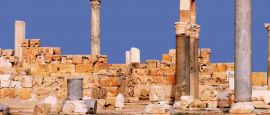Libya Food and Drink
Libyan cuisine is a mixture of Arabic and Mediterranean, with a strong Italian influence. There is an abundance of dates, oranges, apricots, figs, lemons and olives. Hotel restaurants offer international cuisine. Seafood in Tripoli is particularly good. Most restaurants have table service, and although food is traditionally eaten with the right hand only, knives and forks will generally be available in major towns.
Most restaurant meals consist of soup, salad, a selection of meat or fish dishes, vegetables and tea or coffee, followed by a piece of fruit. Some travellers find Libyan cuisine disappointing. Indeed, in the major towns and tourist areas it is often formulaic, with little of the panache seen across the borders in Egypt and Tunisia. But if you are invited into the homes of Libyans, you'll suddenly start to see a difference. Away from the expectation of tourists, Libyan cuisine thrives. You can expect such delicacies as traditional Libyan salad, made with cucumbers, tomatoes and spice, or stuffed sheep's intestines - a wonderful mix of herbs, rice and spices poured into grilled intestines, resulting in a type of homemade gourmet sausage. There are very few restaurants outside of the main towns.
• Couscous.
• Ruuz (a rice dish with a variety of spices, meat and vegetables).
• Rishda (traditional pasta dish with chickpeas, tomato and onion).
• Bazin (hard paste, made from barley, salt and water).
• Zumita (a doughy mix of water and flour, similar to bazin.)
• Desert bread (a traditional circular flatbread that is baked in makeshift ovens beneath the sand in desert areas. The hot sand becomes an effective oven, and you need only shake the bread afterwards to remove the dry sand from it.)
Alcohol is banned in Libya. Nevertheless, some Libyans make their own beer or wine at home. Moonshine, which can often be incredibly strong, is sometimes sold illegally. If you're in the market for this, make sure you are buying it from a reputable brewer who can be vouched for; there have been cases of severe alcohol poisoning after travellers ingested strong moonshine. Lunch is usually served late in Libya, between 1330 and 1500 in the afternoon, even in hotels. Dinner is generally served from 1900 onwards in most establishments.
Libyan sweet tea is served thick, in a small glass, often accompanied by mint or peanuts. Tea pouring ceremonies can last for a long time, particularly outside of the main towns. They are often as much about the ritual of the experience than the tea itself; indeed, some Libyans maintain that the amount of time spent pouring the tea makes little difference to its taste. In addition to traditional sweet tea, you can also order red or green tea throughout the country, including at service stations. Coffee is also drunk regularly.
Do you have any Feedback about this page?
© 2026 Columbus Travel Media Ltd. All rights reserved. No part of this site may be reproduced without our written permission, click here for information on Columbus Content Solutions.




 You know where
You know where